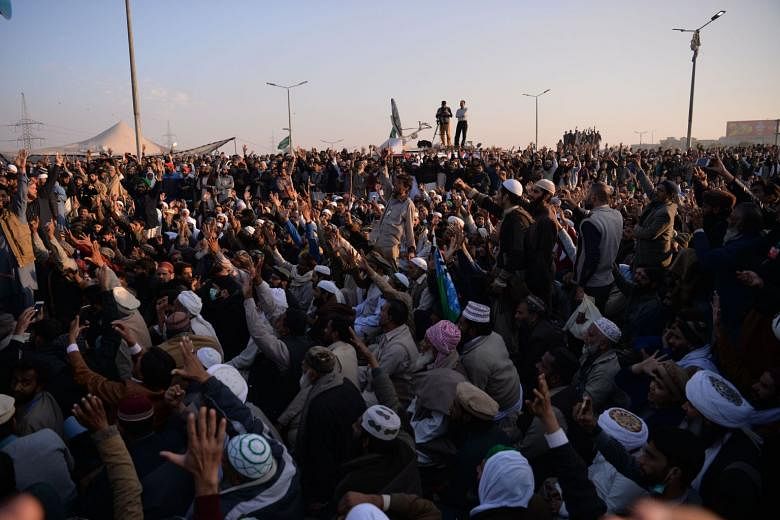How seriously should one take President Donald Trump's tweets? His first tweet of the year, calling out the "lies and deceit" of Pakistan, had pretty much all of India whooping in approval.
His remarks on Pakistan's failure to act against the terrorist groups it has cultivated, and his administration's subsequent announcement that it would be freezing nearly all of its millions of dollars in security assistance to Pakistan, was a "gotcha" moment for New Delhi.
For years, Pakistan's deep state (controlled by its all-powerful military and covert agencies) has used terrorism as an instrument of asymmetric warfare both in India and Afghanistan. For Indians, Mr Trump's tweet and the suspension of funds was a moment of vindication.
But the unfortunate reality is that publicly shaming Pakistan, as Mr Trump has done, and even the cuts in security aid have very little real impact on a country whose skin has grown comfortably thick from rhetorical battering.
Pakistan survives in the smug belief that after the United States' grandstanding is done and over, Washington will eventually turn to it to mop up its half-finished mess in Afghanistan. Holding back the dollars every few years is just a nip and tuck, when what's really needed is a surgical uprooting of terrorist support systems inside Pakistan.
The former Pakistani ambassador to the US, Mr Husain Haqqani, agrees. "Pakistan's military has convinced itself that it is acting in Pakistan's national interest and that pursuing that interest is more important than US aid. An aid cut-off may not be the huge price that would force Pakistan to change a policy of terrorism that is now three decades old. President Trump would have to go farther than an aid cut-off to force Pakistan's hand," he said.
A high-ranking Indian official who works on Afghanistan told me: "Putting an end to terrorist sanctuaries and safe havens in Pakistan is essential to bringing peace to Afghanistan and the region."
While Mr Trump's bombastic outburst gives the impression of a dramatic first-time tectonic shift in policy, American military aid has been scaled back from Pakistan several times in the past, including, most recently, during the Obama years.
In 2011, the Obama administration suspended US$800 million (S$1 billion) of military aid two months after US Navy Seals took out Osama bin Laden in a residential compound just three hours away from Pakistan's capital, Islamabad. In 2015, US$300 million of the Pentagon's Coalition Support Funds were made conditional on Pakistan acting against the Haqqani network terrorist group in Afghanistan - Pakistan's main spy agency, the Inter-Services Intelligence, has long been accused of patronising and protecting the group. Frankly, none of it has worked.
Last year, Mr Husain Haqqani co-wrote a paper with Ms Lisa Curtis (who today serves as part of the Trump administration) asserting that Americans need to stop viewing Pakistan as an ally.
"The new US administration should recognise that Pakistan is not an American ally. It has engaged in supporting the Afghan Taleban, who have killed American troops and their allies in Afghanistan," they wrote in the Hudson Institute paper, going on to say that the US must "keep the option of using unilateral action (including drones) to target Taleban targets in Pakistan".
Mr Trump's stance on Pakistan could also have implications for the US-China proxy war in Asia, as Pakistan moves closer into China's embrace. This week, right after Mr Trump's tweet, Pakistan's central bank gave the green light for using the yuan, instead of the dollar, as a currency for bilateral trade with China.
Beijing brings more than US$60 billion in investment and infrastructure, prompting the question of whether Pakistan is now effectively a Chinese vassal.
How Pakistan responds to Mr Trump's threats will come down to whether the US is willing to stay the course in Afghanistan or fundamentally change its policy.
The US would have to end its dependence on Pakistan as the main supply route for Nato troops to landlocked Afghanistan. It would have to commit to using the more expensive and complicated northern route via Central Asia or spend much more flying in supplies. It would also have to work harder at getting the Afghan Taleban to the negotiating table. A failing, inconclusive war in Afghanistan or any US abandonment of the country will only result in a brazen Pakistan, indifferent to Mr Trump's threats.
The US also needs to use its leverage to strengthen Pakistan's civilian leadership instead of its army's remote-control rulers. This week, ousted former prime minister Nawaz Sharif called on his country to reflect on its lack of credibility on the world stage, reminding people that he had asked military commanders to isolate militants. But democratically elected civilians have never been able to take control of Pakistan's security policies.
From an Indian perspective, while Mr Trump's actions score well for Indian diplomacy, no one doubts that US self-interest, not principled concerns about Pakistan's patronage of terrorist groups in Kashmir, triggered this outburst.
In November, American lawmakers dropped a provision that conditionally linked aid to Pakistan to a crackdown on the Lashkar-e-Taiba, the Pakistani terrorist group responsible for a spate of attacks inside India (including the November 2008 attacks in Mumbai).
The bill voted into law retained the clause on linking US aid only to Pakistan's curbing of the Haqqani network in Afghanistan. This free pass to Pakistan on some terrorist groups, while expecting it to act against others, is part of the schizophrenia that has defined US policy.
Mr Trump's tweet exposes Pakistan's double standards on terrorism. But the US needs to examine its own.
WASHINGTON POST

